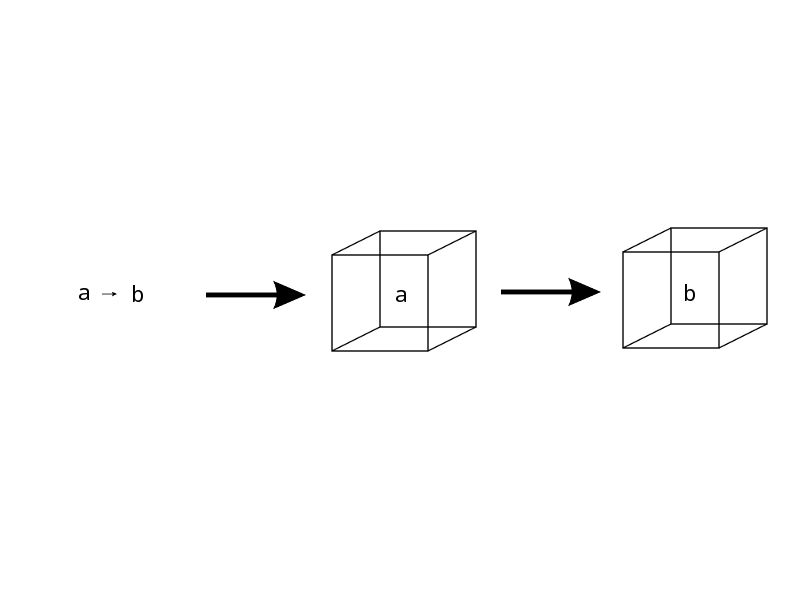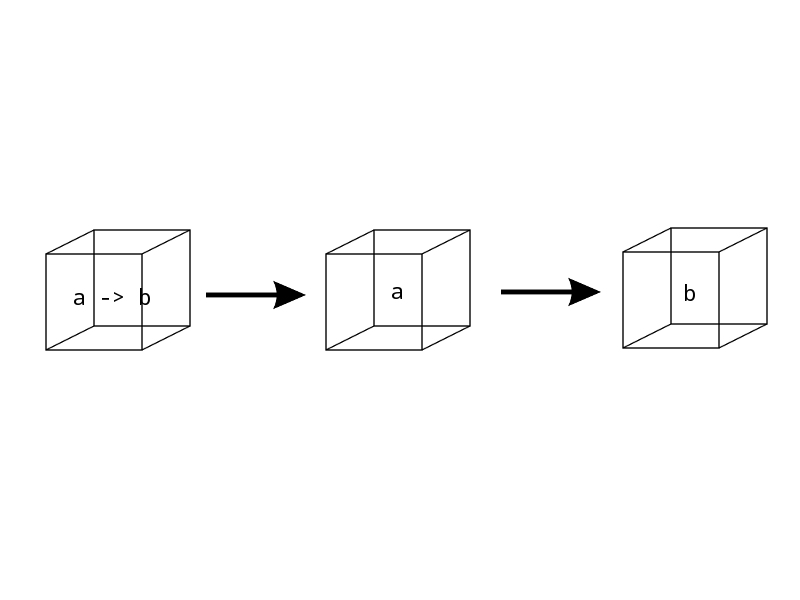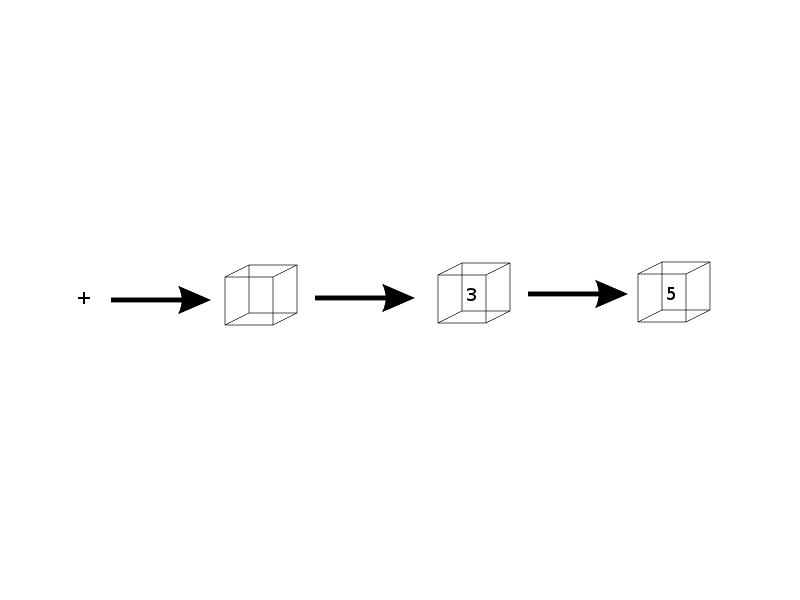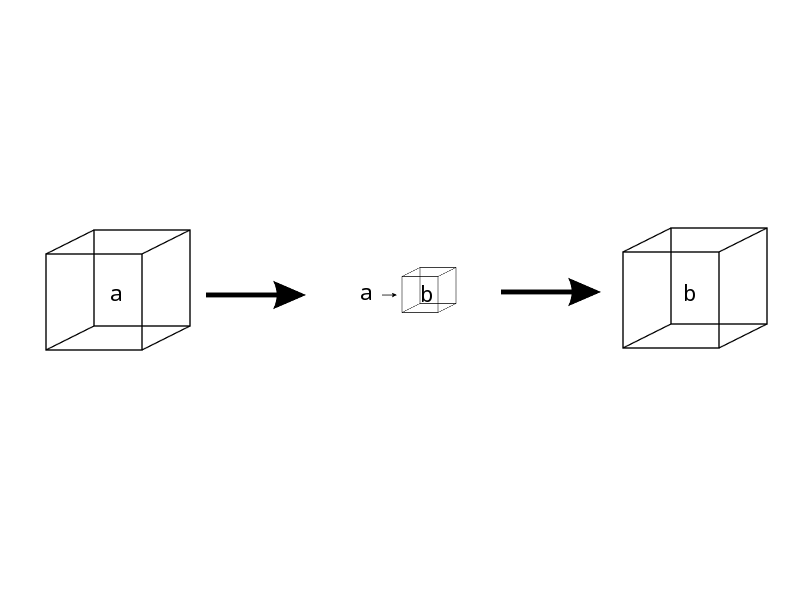isOdd :: Int -> Bool
isOdd x = (x `mod` 2) /= 0What the hell are math nerds talking about?
Daniel HinojosaPurpose for this presentation
Distill some of the more difficult terms in functional programming, show it in Haskell and on as many possible languages of the JVM
Part 1 of this presentation
- Higher order functions
- Type classes
- Ad-hoc Polymorphism,
- Types vs. kinds
- Functors
Haskell
- "Pure" Functional Language
- Simon Peyton Jones, Lennart Augustsson, Eric Meijer, Philip Wadler
- Designed in 1990
- static, strong, and inferred
- Cross Platform
- Compiled & Interpreted
Haskell Basic Types
Int- Bounded IntegerInteger- Unbounded IntegerFloat- Floating PointDouble- Double PrecisionBool- BooleanChar- Character (String are list of chars)Tuples- Types surrounded by parenthesis
Basic Method in Haskell
What is mod with the backticks?
First off, here is the signature.
What the hell is a?
mod :: Integral a => a -> a -> aTake 2, and Returns 1
Look at mod a different way
(mod 5 2)This would work and return 1
Since it is a Take 2 and Return 1…
5 `mod` 2Another Function!
Specifying the types before the method
sumThree :: Int -> Int -> Int -> Int
|---- Take 3-----|Combine with the implementation of sumThree
sumThree :: Int -> Int -> Int -> Int
sumThree x y z = x + y + zTo actually run sumThree
sumThree 1 2 3Note: x, y, z is pattern matched
Currying
Another way to look at sumThree is through currying…
sumThree :: Int -> Int -> Int -> Int
sumThree x y z = x + y + zI can partially apply sumThree
let f = sumThree 2 1f(4) -- 7Type Variables
myHead :: [a] -> a
myHead [] = error "empty list"
myHead [x] = x
myHead (x:xs) = xThis is analogous to in Java:
public A <A> myHead(List<A> list) {...}Filtering with Haskell lambdas
filter (\x -> x `mod` 2 /= 0) [1,2,3,4]Becomes:
[1,3]Filtering with predefined functions
Remember this?
isOdd :: Int -> Bool
isOdd x = (x `mod` 2) /= 0We can apply it to as a function, since it is a function!
filter f [1,2,3,4]Evaluates to…
[1,3]Mapping with Haskell Lambdas
map (\x -> x * 3) [1,2,3,4]Becomes:
[3,6,9,12]Mapping with Haskell Postfix Lambdas
map (3*) [1,2,3,4]Becomes:
[3,6,9,12]Map is an interesting signature
map :: [a] -> (a -> b) -> [b]This is a higher order function!
Note: b can represent another type
Looking at map again…
map (3*) [1,2,3,4]Since b can be another type, therefore we can do…
map (\i -> "Hello " ++ show i) [1,2,3,4]Evaluates to…
["Hello 1", "Hello 2", "Hello 3", "Hello 4"]FYI: Show converts anything to String when it can.
Trying another higher order function
myZipWith :: (a -> b -> c) -> [a] -> [b] -> [c]
myZipWith _ [] _ = []
myZipWith _ _ [] = []
myZipWith f (x:xs) (y:ys) = f x y : myZipWith f xs ysSimple Case:
myZipWith (+) [1,2,3] [4,5,6]Evaluates To:
[5, 7, 9]Higher Difficulty Case:
let a = [1,2,3,4,5,6]
let b = ["Rock", "Jazz", "Country", "Salsa", "Polka", "Hip Hop"]
putStrLn (show $ myZipWith (\i s -> s ++ " " ++ show i) a b)What does using a higher function look like in Java?
Not really a higher order function but close a function into a method…
static <A,B,C> Stream<C> zip(Stream<? extends A> a,
Stream<? extends B> b,
BiFunction<? super A,? super B,? extends C> zipper)How do we use it?
let a = Arrays.asList(1,2,3,4,5,6);
let b = Arrays.asList("Rock", "Jazz", "Country",
"Salsa", "Polka", "Hip Hop");
Streams.zip(a.stream(),
b.stream(),
(x, y) -> y + " " + x).
collect(Collectors.toList())Note: Using it wasn’t bad, but if you had to create your own zip, rough
Higher Order Functions in Scala
val a = List(1,2,3,4,5,6)
val b = List("Rock", "Jazz", "Country", "Salsa", "Polka", "Hip Hop")
a.zip(b).map{case (i,s) => s + " " + i}Higher Order Functions in Groovy
def a = [1,2,3,4,5,6]
def b = ["Rock","Jazz","Country","Salsa","Polka","Hip Hop"]
[a,b].transpose().collect{x -> x[1] + " " + x[0]}Higher Order Functions in Clojure
(def a [1 2 3 4 5 6])
(def b ["Rock" "Jazz" "Country" "Salsa" "Polka" "Hip Hop"])
(map #(str %2 " " %1) a b)Type Classes
That we can do this in Java
interface Eq <A> {
public boolean equals (A a, A b);
default public boolean notEquals (A a, A b) {
return !equals(a,b)
}
}Lets Make an Instance for Eq and say for type Cow
package com.example.cowtypeclasses
public class CowEquivalenceByName implements Eq<Cow> {
public boolean equals (Cow a, Cow b) {
a.getName().equals(b.getName());
}
}Now lets say we can "bind" this in scope
In other words…
- By implementing an interface, we make this object available for anything that needs to use it.
- We have the power to
importthisCowEquivalencewhen ever we need to strategically use it. - We can choose another implementation of Cow if we have another equivalence strategy
- Think of a Strategy Pattern that instead of setters we use imports!
Other ways to look at it
If we have the ability to create both classes in the same package (Java doesn’t do this I know)
package com.example.cowtypeclasses
public class CowEquivalenceByName {...}
public class CowEquivalenceByWeight {...}In some random method in some other package…I can do
public void foo(Cow a, Cow b) {
import com.example.cowtypeclasses.CowEquivalenceByWeight
a.equals(b); //true if equal weight!
}That’s a type class!
Coming back to Haskell
First off:
- There are no objects in Haskell. Get That?
- This is a functional language!
- Damn it! Listen to me I’m serious!
What Haskell has are "Algebraic Data Types"!
data GameResult = Win | Loss | TieWhat does the Eq type class look like?
This is already built into Haskell
class Eq a where
(==) :: a -> a -> Bool
(/=) :: a -> a -> Bool
x == y = not (x /= y)
x /= y = not (x == y)Warning: class is not a Java class. It is a type class!
Now we will make an instance of the type class:
instance Eq GameResult where
Win == Win = True
Loss == Loss = True
Tie == Tie = True
_ == _ = FalseWarning: By instance we don’t mean an object we mean "an implementation" of the type class
Using the type class
(Win == Win) -- True
(Loss == Win) -- FalseType Classes in Scala
trait Eq[a] {
def eq(a1: a)(a2: a): Boolean
}sealed abstract class GameResult
final case object Win extends GameResult
final case object Loss extends GameResult
final case object Tie extends GameResultimplicit class GameResult extends Eq[GameResult] {
def eq(a1:GameResult, a2:GameResult) = (a1, a2) match {
case (Win, Win) => true
case (Loss, Loss) => true
case (Tie, Tie) => true
case _ => false
}
}def newIsEquals(x:GameResult, y:GameResult)(implicit val eq:Eq[GameResult]) = {
eq(x)(y)
}Type classes in Clojure
(defprotocol Eq
(equal-to [x y])
(not-equal-to [x y])
)
(extend-type clojure.lang.Keyword
Eq
(equal-to [x y] (= x y))
(not-equal-to [x y] (not= x y))
)
(println (equal-to :Win :Win))
(println (equal-to :Loss :Loss))
(println (equal-to :Tie :Tie))
(println (equal-to :Win :Loss))Ad Hoc Polymorphism
- Something badass you can tell your boss to get a raise
- It actually has to do with the ability of types
- Also known as "overloading"
- Definition that we can use the
Eqtype class for various types!
More about Ad Hoc Polymorphism
(1 == 4)This works because there is an instance of Eq Int
("Hello" == "Hello")This works because there is an instance of Eq String
(Win == Win)This works because we said so and is an instance of Eq GateResult
Extending Type Classes
class (Eq a) => Ord a where
(<), (<=), (>=), (>) :: a -> a -> Bool
max, min :: a -> a -> aKinds Vs. Types
Types
- Type are what are classes in Java
Prelude> :t 4
4 :: Num a => aPrelude> :t "What is love? Baby don't hurt me"
"What is love? Baby don't hurt me" :: [Char]Kinds
Kinds are a description of the type
Prelude> :k Int
Int :: *"In order to create a type Int, how many extra things do we need?"
Introduction to the Maybe Type
Algebraic Data Type of Maybe
data Maybe a = Nothing | Just aPrelude> Just 3
Just 3
Prelude> Just "Blueberry Pancakes"
Just "Blueberry Pancakes"
Prelude> Nothing
Nothing
Prelude> Just 10 :: Maybe Double
Just 10.0The Type of Maybe
Prelude> :t Just "Blueberry Pancakes"
Just "Blueberry Pancakes" :: Maybe [Char]Prelude> :t Just 90
Just 90 :: Num a => Maybe aThe Kind of Maybe
First off, remember this signature…
data Maybe a = Nothing | Just aPrelude> :k Maybe
Maybe :: * -> *Prelude> :k Maybe Int
Maybe Int :: *The Either type
data Either a b = Left a | Right bPrelude> Left 10
Left 10
Prelude> :t Left 10
Left 10 :: Num a => Either a bWhat do you think the unsatisfied kind is of Either?
The Kind of Either
Prelude> :k Either
Either :: * -> * -> *Prelude> :k Either Int
Either Int :: * -> *:k Either Int [Char]
Either Int [Char] :: *The List Type
Prelude> :t []
[] :: [a]Prelude> :t [1,2,3,4]
[1,2,3,4] :: Num t => [t]What is the kind of []?
Kind of []
Prelude> :k []
[] :: * -> *Prelude> :k [Int]
[Int] :: *Functor Type Class
This is where things get "kind" of hard
class Functor f where
fmap :: (a -> b) -> f a -> f bf has a requirement, what kind does f have to be?
Discovering Kinds in Functor
class Functor f where
fmap :: (a -> b) -> f a -> f bf a means whatever f is it requires an a
f b also means whatever f is, it requires a b
Because f requires one thing *, therefore we know that f is * -> *
Quick! It’s up to us now to find a kind of * -> *!
Visual Functor

Plugging in a kind of Maybe
Reminder #1:
data Maybe a = Nothing | Just aReminder #2:
class Functor f where
fmap :: (a -> b) -> f a -> f bReminder #3:
Prelude> :k Maybe
Maybe :: * -> *Well that’s what we need a kind of * → *!
instance Functor Maybe where
fmap f (Just x) = Just (f x)
fmap f Nothing = NothingUsing a Maybe Functor
fmap (\x -> x * 14) (Just 19)Results in:
Just 266I could’ve written it like this…
fmap (14*) (Just 19)Now, trying with Nothing
fmap (22+) NothingResults in:
NothingList Functor
Reminder of the kind of []
Prelude> :k []
[] :: * -> *It works! Therefore to make it a Functor:
instance Functor [] where
fmap f xs = map f xsor
instance Functor[] where
fmap = mapTherefore fmap and map should work the same
Prelude> fmap (12*) [1,2,3,4,5]
[12,24,36,48,60]
Prelude> map (12*) [1,2,3,4,5]
[12,24,36,48,60]Either Functor
Reminder of the Algebraic Data Type
data Either a b = Left a | Right bThe problem with Either is that it’s kind is..
Prelude> :k Either
Either :: * -> * -> *and it is not * -> * like we need it to be, therefore we need satisfy one half of the kind pattern.
instance Functor (Either a) where
fmap f (Right x) = Right (f x)
fmap f (Left x) = Left xReminder:
class Functor f where
fmap :: (a -> b) -> f a -> f bUsing the Either Functor
Prelude> fmap ("Nice " ++) (Right "Code")
Right "Nice Code"
Prelude> fmap (20*) (Left 30)
Left 30Part 2 of this presentation
- Some More Functors
- Applicatives
- Monoids
- Monads
What do Functors look like in Java?
…if we had the ability to do this in Java
public F<B> <A, B, F extends Functor> fmap(x:A, f:F<A>) {
....
}But we can’t. We cannot do F<B> because F is unknown, and java needs that. F is what is known as a Higher Kinded Type
Scala has Higher Kinded Types!
trait Functor[F[_]] { self =>
def map[A, B](fa: F[A])(f: A => B): F[B]
}
implicit object ListFunctor extends Functor[List] {
override def map[A, B](fa: List[A])(f: (A) => B): List[B] = fa.map(f)
}
implicit object OptionFunctor extends Functor[Option] {
override def map[A, B](fa: Option[A])(f: (A) => B): List[B] = fa match {
case Some(x) => Some(f(x))
case None => None
}
}
/* Power play! I only need to declare once! Remember ad-hoc polymorphism! */
def fmap[A, B, C[_]](f:A => B)(coll:C[A])(implicit functor:Functor[C]) =
functor.map(coll)(f)
fmap(x => x + 2)(List(1,2,3,4)) //List(3,4,5,6)
fmap(x => x + 2)(Some(100)) //Some(102)
fmap(x => x + 19)(None) //NoneApplicatives
- Beefed up functor
- Functors take one param
- Consider:
fmap (+) (Just 10)Turns into:
(Just ((+) 10))Which is the same as:
(Just (10+))Where the type is:
:t Maybe(Int -> Int)Other Partial Maps
fmap (+) [1,2,3,4,5]Where the type is…
:t [Integer -> Integer]or
fmap (\x y z -> x + y + z) [1,2,3,4,5]Where the type is…
:t [Integer -> Integer -> Integer]What if we wanted to do…
op Just(4*) Just(5)so we can get Just(9)?
Applicative Functors Definition
class (Functor f) => Applicative f where
pure :: a -> f a
(<*>) :: f (a -> b) -> f a -> f bNote: Applicatives are Functors
It’s pure baby

It’s pure baby

pure 5 :: Maybe IntMore pure:
pure 3 :: Either String IntWill return:
Right 3Contrasting and Comparing <*> and fmap
fmap :: (a -> b) -> f a -> f a<*> :: f (a -> b) -> f a -> f bEnvisioning what <*> looks like

Envisioning what <*> looks like

<*> Just(*3) Just 4Envisioning what <*> looks like

Just(*3) <*> Just 4Building another applicative

pure (+) <*> Just 3 <*> Just 5Building another applicative

pure (*) <*> Nothing <*> Just 9List Applicatives
instance Applicative [] where
pure x = [x]
fs <*> xs = [f x | f <- fs, x <- xs]Pure List Applicatives
pure 3 :: [Int]Converts to:
[3]pure "Dance" : [String]Converts to:
["Dance"]Note: String is an alias for [Char]
So how do we read List Applicative’s <*>?
The signature is
fs <*> xs = [f x | f <- fs, x <- xs]`This is called a for comprehesion
[(1*), (2+)] <*> [3, 9][3, 9, 5, 11]A slightly complicated Applicative chain
[(+), (*)] <*> [4,5] <*> [1,9]Taking it in parts
[(+4), (+5), (*4), (*5)] <*> [1,9]
[5, 13, 6, 14, 4, 36, 5, 45]What does Applicative look like in Scala?
trait Applicative[F[_]] {
def pure[A](a:A):F[A]
def apply[A, B](fa: F[A])(f:F[A=>B]):F[B]
}
implicit object ListApplicative extends Applicative[List] {
override def pure[A] (a:A) = List(a)
override def apply[A, B](xs: List[A])(fs: List[A => B]): List[B] =
for (f <- fs;
x <- xs) yield f(x)
}
implicit object OptionApplicative extends Applicative[Option] {
override def pure[A] (a:A) = Some(a)
override def apply[A, B](fa: Option[A])(f: Option[A => B]): Option[B] = (f, fa) match {
case (None, _) => None
case (_, None) => None
case (Some(f), Some(i)) => Some(f(i))
}
}
def applicate [A, B, C[_]](f:C[A => B])(coll: C[A])(implicit applicative:Applicative[C]) = {
applicative.apply(coll)(f)
}
println(applicate(Some((x:Int) => x * 4):Option[Int => Int])(Some(5):Option[Int]))
println(applicate(List((x => x + 1), (x => x + 4)):List[Int => Int])(List(3, 9)))Some(20)
List(4,10,7,13)
Monoids
- Monoids combines things that are associative, regardless of order or parenthetical categorization:
- Examples
`3 * 4``2 + 10`((r + s) + t) or (r + (s + t))- A higher abstract to append one item to another, but in a type class way
- Functional Programmers are obsessive about using one method to work with many types
Monoid Definition
class Monoid m where
mempty :: m
mappend :: m -> m -> m
mconcat :: [m] -> m
mconcat = foldr mappend memptyMonoid Rules
mempty `mappend` x = x
x `mappend` mempty = x
(x `mappend` y) `mappend` z = x `mappend` (y `mappend` z)List Monoids
instance Monoid [a] where
mempty = []
mappend = (++)Prelude> [1,2,3] `mappend` [4,5,6]
[1,2,3,4,5,6]
Prelude> "What's" `mappend` "cool"
What'scool
Prelude> mempty::[String]
[]
Prelude> mempty::[Int]
[]
Prelude> mempty::String
""
Prelude> mconcat [[1,2], [3,5,6,7,10], [12, 19]]
[1,2,3,5,6,7,10,12,19]foldr?
Prelude> let g = foldr (+) 0
Prelude> g [1,2,3,4,5]
15Repeating from the previous slide
Prelude> mconcat [[1,2], [3,5,6,7,10], [12, 19]]
[1,2,3,5,6,7,10,12,19]What does a monoid look like in Scala?
trait Monoid[A] {
def op(a1: A, a2: A): A
def zero: A
}
val stringMonoid= new Monoid[String] {
def op(a1: String, a2: String) = a1 + a2
val zero = ""
}
def listMonoid[A] = new Monoid[List[A]] {
def op(a1: List[A], a2: List[A]) = a1 ++ a2
val zero = Nil
}So far we have discovered..
fmap :: (Functor f) => (a -> b) -> f a -> f b(<*>) :: (Applicative f) => f (a -> b) -> f a -> f b..and now Monads!
fmap :: (Functor f) => (a -> b) -> f a -> f b(<*>) :: (Applicative f) => f (a -> b) -> f a -> f b(>>=) :: (Monad m) => m a -> (a -> m b) -> m bMonads in Visual Form

(>>=) :: (Monad m) => m a -> (a -> m b) -> m bThe complete Monad typeclass
class Monad m where
return :: a -> m a
(>>=) :: m a -> (a -> m b) -> m b
(>>) :: m a -> m b -> m b
x >> y = x >>= \_ -> y
fail :: String -> m a
fail msg = error msgreturn?
- Same is
purein Applicative, take an item and put into a context or container
return 4 :: Maybe IntEvaluates To…
Just 4return 4 :: [Int]Evaluates To..
[4]Bind method
(>>=) :: m a -> (a -> m b) -> m bHow we will invoke as such:
ma >>= (a -> m b)Bind will take one monad, and a function that will return a monad of another type, and provide some result
fail
- Monads provide an option for failure as a monad.
- Whereas
returnwill provide a Monad of it’s simplest form failwill return a monad representing failure
The "move-along" function
(>>)will take two monads, and determine with one to pass on down.- By default will accept a the two monads, and return the second one.
The signature is:
(>>) :: m a -> m b -> m b
x >> y = x >>= \_ -> yMaybe Monad
instance Monad Maybe where
return x = Just x
Nothing >>= f = Nothing
Just x >>= f = f x
fail _ = NothingPrelude> Just 4 >>= \x -> return (3*x)
Just(12)
Prelude> Nothing >>= \x -> return(x + 100)
Nothing
Prelude> fail "Help" :: Maybe Int
NothingWhat is the point?
Prelude> Just 10 >>= (\x -> Just (show x ++ "!"))
Just "10!"Prelude> Just 10 >>= (\x -> Just "!" >>= (\y -> Just (show x ++ y)))
Just "10!"Both of the above, are longer than…
Prelude> let x = 3; y = "!" in show x ++ yMonads have built in short circuit error handling
Prelude> Nothing >>= (\x -> Just "!" >>= (\y -> Just (show x ++ y)))
Nothing
Prelude> Just 3 >>= (\x -> Nothing >>= (\y -> Just (show x ++ y)))
Nothing
Prelude> Just 3 >>= (\x -> Just "!" >>= (\y -> Nothing))
NothingBecause Haskell and other programming languages rely on monads…
We are able to convert this…
monadStack :: Maybe String
monadStack = Just 3 >>= (\x ->
Just "!" >>= (\y ->
Just (show x ++ y)))to this…
monadStackWithDo :: Maybe String
monadStackWithDo = do
x <- Just 3
y <- Just "!"
Just (show x ++ y)This is called "Monad Comprehension"
We can even do pattern matching as a Monad Comprehension
firstChar :: Maybe Char
firstChar = do
(x:xs) <- Just "hello"
return xList Monads
Here is the definition of a list monad..
instance Monad [] where
return x = [x]
xs >>= f = concat (map f xs)
fail _ = []And here is how we use it…
[3,4,5] >>= \x -> [x,-x]
[3,-3,4,-4,5,-5]Failure in List Monads
Should be very similar to the Maybe Monad
Prelude> [] >>= \x -> [1,2,3]
[]
Prelude> [1,2,3] >>= \x -> []
[]As a list monad, does this operation look familiar?
Prelude> [10,11,12] >>= (\x -> [x + 1, x + 2, x + 3])
[11,12,13,12,13,14,13,14,15]Flat Map!
Here is Flat Map in Java 8!
Arrays.asList(10, 11, 12).stream().flatMap(x -> Arrays.asList(x + 1, x + 2, x + 3).stream()).collect(Collectors.toList());[11, 12, 13, 12, 13, 14, 13, 14, 15]Flat Map in Scala!
List(10, 11, 12).flatMap(x => List(x + 1, x + 2, x + 3))[11, 12, 13, 12, 13, 14, 13, 14, 15]Flat Map in Scala is used for a variety of things
Like a Maybe Monad
Some(4).flatMap(x => Some(3 + x))Some(7)IO Monad?
main = do
x <- return("Hello ")
y <- return("World")
putStrLn (x ++ y)is the same as
main = do
return("Hello ") >>= \x ->
return("World") >>= \y ->
putStrLn(x ++ y)Note: This is perhaps the single reason why Haskell is always so hard to get started!
Futures Monad in Scala
val future1 = Future {
Thread.sleep(3000)
180 / 2
}
val future2 = Future {
Thread.sleep(3000)
90 / 3
}
val result = future1.flatMap {
x =>
future2.map {
y =>
x + y
}
}Rube Goldbergs and XMonad
Thank you!
Sources:
- Learn you a Haskell for A Greater Good - http://learnyouahaskell.com/
- Functional Programming in Scala - http://www.manning.com/bjarnason/
- Math World Wolfram Alpha - http://mathworld.wolfram.com
- Wikipedia - http://www.wikipedia.org